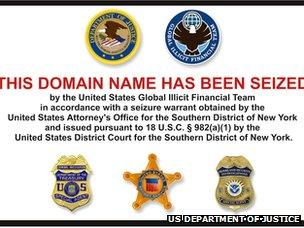US prosecutes '$6bn money-laundering hub'
- Published

Liberty Reserve's web domains were seized during the raids
The Liberty Reserve digital money service that was shut down laundered more than $6bn (£4bn) in criminal cash, US authorities have said.
Weekend police raids in 17 countries scooped up Liberty Reserve's owners, operators and its computer hardware.
The Department of Justice said it was the "largest international money-laundering prosecution in history".
Liberty had about a million users and processed more than 55 million illegal transactions, .
Cash transfer
The documents allege that seven people involved in running Liberty Reserve set up the digital cash service as a "criminal business venture" designed specifically to "help criminals conduct illegal transactions and launder the proceeds of their crimes".
The raids in the US, Spain, Costa Rica and other countries led to the arrests of five of Liberty Reserve's principals, including its founder Arthur Budovsky.
US Attorney Preet Bharara: "Liberty Reserve was intentionally created and structured to facilitate criminal activity"
The service's operators will face charges of money laundering and operation of an unlicensed money transmission system. Also arrested were many of the principal operators of exchanges that fed cash to Liberty for distribution to members of criminal gangs or as the start of the laundering process.
The raids also garnered servers supporting the service and allowed the DoJ to seize the web domains through which the service was run.
Behind the scenes, data traffic for the sites from regular customers was directed to a series of virtual traps, known as sinkholes, that log information about who is trying to use the service.
In addition, it said, 45 bank accounts used by the service have been seized and action has been taken to take over the assets of 35 other sites that fed funds to Liberty Reserve for laundering.
Some details about the scale of the Liberty Reserve operation came to light in court documents unsealed by the New York office of the DoJ, which is leading the action against the service.
The digital money scheme run through the service was one of the world's largest, the DoJ said, and handled $6bn over the seven years it was in operation.
Liberty Reserve was so successful that it became a "financial hub of the cyber crime world", whose users were involved in credit card theft, investment fraud, hacking, child pornography and drug trafficking.
The shutdown has caused problems for legitimate users of Liberty Reserve, said Mitchell Rossetti, head of the EPay Tarjeta service that piggy-backed on LR.
"Thousands upon thousands of LR users are not nor have been involved in illegal activities," he said, "but now have become victims through the closure and seizure of LR."
"We seem to be acceptable collateral damage," he said. "We have committed no crime and want our funds returned to us."
- Published27 May 2013
- Published12 April 2013
- Published2 May 2013